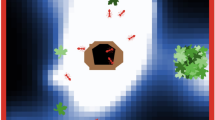Abstract
The paper presents an architecture of a biologically inspired agent. Its physical body is described first. The agent’s movement is directly controlled by Spiking Neural Network. To achieve this goal, the network is trained by a genetic algorithm. The agents move in a 3D physical environment. Their main goal is to effectively translocate themselves using a virtual body structure and muscles. This approach is inspired by a biological assumptions, where the neural network receives signals from sensors and directly controls the muscles. The application of Spiking Neural Network needs a suitable signal encoding method, which is also described. The system is flexible and it allows to create agents with various body structures and different neural controllers. Experiments presented in the paper refer to a simple snake-like creature. The effectiveness of controllers based on a standard threshold network and the spiking one are compared.
Access this chapter
Tax calculation will be finalised at checkout
Purchases are for personal use only
Preview
Unable to display preview. Download preview PDF.
Similar content being viewed by others
References
Maass, W., Bishop, C.M. (eds.): Pulsed Neural Networks. MIT Press, Cambridge (1999)
Bothe, S.M.: Spiking Neural Networks. Thesis, Centre for Computer Science and Mathematics, Leiden (2003)
Loiselle, S., Rouat, J., Pressnitzer, D.: Exploration of Rank Order Coding with Spiking Neural Networks for Speech Recognition. In: Proceedings of International Joint Conference on Neural Networks 2005, Montreal, vol. 4, pp. 2076–2080 (2005)
Masuta, H., Kubota, N.: The perception for partner robot using spiking neural networks in dynamic environment. In: SICE Annual Conference 2008, Tokyo, pp. 2001–2006 (2008)
Wiklendt, L., Chalup, S.K., Seron, M.: Quadratic Leaky Integrate-and-Fire Neural Network tuned with an Evolution-Strategy for a Simulated 3D Biped Walking Controller. In: Eighth International Conference on Hybrid Intelligent Systems, Barcelona, pp. 144–149 (2008)
Sims, K.: Evolving Virtual Creatures. In: Proceedings of the 21st annual conference on Computer graphics and interactive techniques, New York, pp. 15–22 (1994)
Author information
Authors and Affiliations
Editor information
Editors and Affiliations
Rights and permissions
Copyright information
© 2010 Springer-Verlag Berlin Heidelberg
About this paper
Cite this paper
Dzieńkowski, B.J., Markowska-Kaczmar, U. (2010). Biologically Inspired Agent System Based on Spiking Neural Network. In: Jędrzejowicz, P., Nguyen, N.T., Howlet, R.J., Jain, L.C. (eds) Agent and Multi-Agent Systems: Technologies and Applications. KES-AMSTA 2010. Lecture Notes in Computer Science(), vol 6071. Springer, Berlin, Heidelberg. https://doi.org/10.1007/978-3-642-13541-5_12
Download citation
DOI: https://doi.org/10.1007/978-3-642-13541-5_12
Publisher Name: Springer, Berlin, Heidelberg
Print ISBN: 978-3-642-13540-8
Online ISBN: 978-3-642-13541-5
eBook Packages: Computer ScienceComputer Science (R0)




